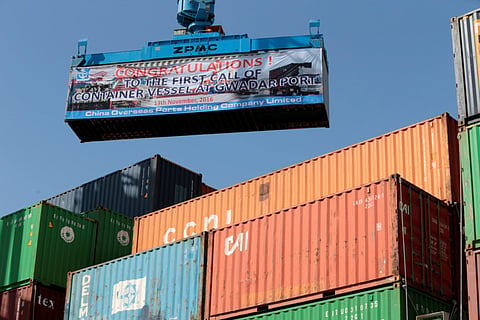Strategic realignment in South Asian politics
To stabilise the Afghanistan-Pakistan region, that’s key to Moscow’s vital interests in Asia

When Russian Ambassador to Pakistan Alexey Dedov mooted the proposal of aligning his country’s ambitious Eurasian Economic Union (EAEU) initiative with the Chinese-funded $46 billion (Dh169.18 billion) China-Pakistan Economic Corridor (CPEC) project recently, Indian security experts wasted no time in connecting the dots to predict an emerging axis between Russia, China and Pakistan.
Moscow’s support for CPEC, considered to be a threat to New Delhi’s geo-strategic ambition in the extended South Asian region, virtually stirred up a hornet’s nest in the Indian establishment, with veteran foreign policy analyst and a leading figure of India’s ruling Bharatiya Janata Party, Sheshadri Chari, even calling for an all-out national effort to dissuade the Russians from embracing Pakistan. The seed for a robust Russia-Pakistan strategic partnership, in fact, was sowed in the winter of 2014 during Russian Defence Minister Sergey Shoigu’s Pakistan trip — the first by a Russian defence ministry’s political executive in 45 years — on the second leg of a tour that initially took him to Beijing.
In a clear sign of rapprochement, Russia began cozying up to its Cold War foe, through the lifting of self-imposed arms embargo and the signing of a landmark first-of-its-kind military cooperation agreement, apart from fostering geo-strategic collaboration and strengthening business relationship. Most importantly, there is a convergence of views on most international and trans-regional issues, with Russia looking upon Pakistan as an important partner in restoring regional stability — as evident from Russian General Valery Gerasimov’s candid, on-record, admission and successful completion of the maiden Russia-Pakistan consultation on regional issues.
In fact, Vyacheslav Trubnikov, ex-chief of Russian foreign intelligence who served as his country’s deputy foreign minister and ambassador to India, is also of the opinion that amalgamation of EAEU and CPEC will help build a solid foundation for a multilateral Eurasian security partnership. An advocate of cooperative competition, Trubnikov told me, such an endeavour will consolidate the fight against international terrorism.
Surely, a long-time strategic ally like Russia, having backed India to the hilt in multilateral forums, slowly drifting away from New Delhi’s strategic ambit is a cause for worry, notwithstanding India’s shift towards Washington in an attempt to become the lynchpin of America’s pivot to Asia.
A strategic realignment in the Indian Ocean region was inevitable in the backdrop of India’s growing defence ties with America, Japan and Australia bilaterally as well as multilaterally. With New Delhi going all out to give a new shape to India-Japan-US-Australia axis in the Indo-Pacific, Russia is bound to probe new frontiers of military cooperation with Pakistan and take it to a strategic level. In fact, it is now clear that Moscow and New Delhi no longer share common viewpoints on Pakistan’s role in global geopolitics, the reason why Russia went ahead with the joint military drill with Pakistani forces, ignoring India’s formal objection.
Despite maintaining certain distance with Islamabad overtly, Kremlin’s realpolitik strategy is to elevate Pakistan’s regional status because of growing concern of spill-over of radical extremist elements to the resource-rich Central Asian region in Russia’s backyard. The fact of the matter is a thriving defence trade, which became the raison d’etre of strategic relations between India and Russia in the post-Cold War era, has suddenly turned into a liability.
As sanctions against Indian defence entities were lifted and high-technology export controls eased gradually, thanks to American diplomatic overdrive, an unequivocal message went out to Moscow that New Delhi will no longer put all its eggs in one basket vis-a-vis defence acquisition. There were telltale signs, signalling a sudden freeze in the overall Indo-Russian defence ties, with Moscow consciously deciding to downgrade India to a “preferred partner” from an exclusive one in the long-standing military-cum-technical relationship.
Today, the Russians, notwithstanding the multi-billion dollar defence deal inked during President Vladimir Putin’s participation in BRICS (Brazil, Russia, India, China, South Africa) summit held in India, are no more hesitant to arm Pakistan with Mi-35 attack helicopters, thus consolidating Islamabad’s ability to confront the growing menace of Daesh (the self-proclaimed Islamic State of Iraq and the Levant) in the tricky terrain of Hindu Kush. Besides, to stabilise the Afghanistan-Pakistan region, which is key to safeguarding Moscow’s vital economic and security interests in the Caucasus and Central Asia, the Russian leadership did not even hesitate to draw China into the ring, by way of supplying advanced Sukhoi-35 fighter aircraft to Beijing.
For India, the Moscow-Islamabad military entente or the call for inter-linking of EAEU and CPEC should not be worrisome. Both the Russian and Chinese efforts to integrate the Eurasian landmass are in a nascent state. As Trubnikov candidly admits, it may take decades to fulfil the obligations of EAEU treaty, because creation of a common economic-cum-energy market is easier said than done.
Moreover, New Delhi’s bilateral trade with Moscow is expected to touch $30 billion by 2025, apart from the lucrative business opportunities available in the civil-nuclear energy and other critical sectors that will inevitably draw Russian investment.
However, it is imperative for India, too, to join Russia, China and others in strengthening Pakistan’s capability to counter the terror network operating in the region, if it does not want to get isolated in South Asia’s geo-strategic chess game.
Seema Sengupta is a Kolkata-based journalist and columnist.



